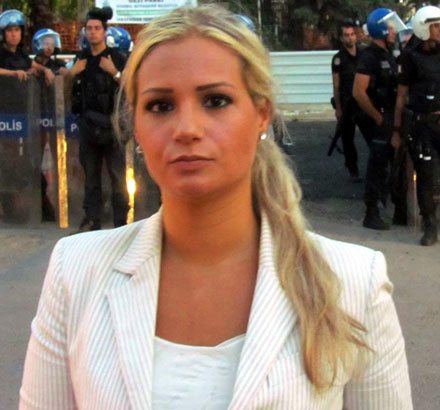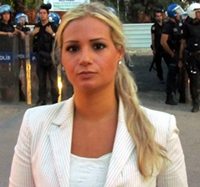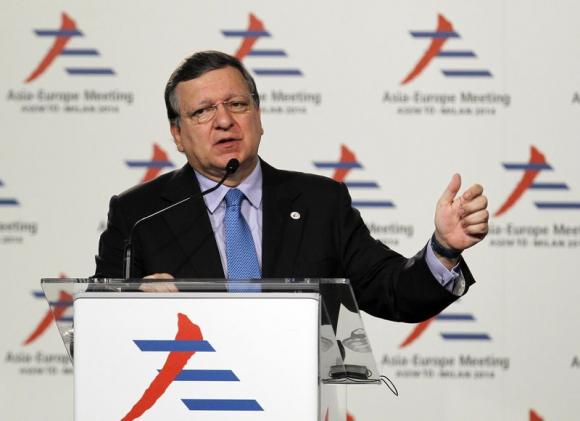
13 October 2014
Istanbul
Aydinlik Daily correspondent Mustafa Birol made an interview with former US Army officer and columnist James Ryan concerning his criminal complaint towards the governments of United States, Turkey, Saudi Arabia, Qatar, Belgium, Bulgaria, Croatia, France, Great Britain, Jordan and Romania regarding violations of Article 7 and 8 of the Rome Statute.
Mustafa Birol:
I talked to James Ryan, a graduate of the United States Military Academy at West Point and also a columnist in Aydinlik Daily, concerning his criminal complaint entitled “Criminal Carnage in Syria by the Criminal Cabal for Perpetual War” towards 12 countries including the US and Turkey to the International Criminal Court regarding violations of Article 7 and 8 of the Rome Statute which deal with war crimes and the crime of aggression.
— You have very recently made a criminal complaint against 11 countries including the USA and Turkey for alleged infringements of Articles 7 and 8 of the Rome Statute of the International Criminal Court. Your criminal complaint constitutes a detailed summary of the war crimes conducted by the countries which can be defined as the anti-Syria coalition. Can you please tell me about the process which prompted you to make the criminal complaint and also the political developments that shaped your application?
Just living is a process, and not an easy one. The seeds for my filing this Complaint came from living in a foreign land, in my case, Turkey. Living abroad is the best way to see one’s native country as a foreign land. It’s called objectivity. I am a graduate of West Point, the United States Military Academy. It has an honor code—cadets will not lie, cheat or steal. And they are bound by honor to report themselves if they do. They face expulsion for an infraction. That moral behavior is intended to last long after graduation. A deceitful military officer is a danger to all.
In 2006, there was great concern that the illegality of Bush’s attack on Iraq could lead to war crimes charges being made against US military personnel. I and two other classmates began an organization called West Point Graduates Against the War ). We were appalled by the deceitful, murderous behavior of the government of the United States. The commander-in-chief of the military, George W. Bush, was a liar. And we had hundreds of fellow graduates who agreed and joined the organization. And so we come to today to the horrors in Syria and the awful truth about America and its criminal accomplices.
The political developments can be described by two words—greed and immorality. For oil, for power, for new markets, for post-bombing reconstruction contracts, anything and everything to do with money. America and its criminal accomplices live by the rule of the jungle, demonizing all who stand in their way, the latest target being Bashar al-Assad, president of Syria. Syria is a secular, culturally diverse, religion-tolerant country, something America should surely encourage. It is bewildering to me that America is so intent on destroying all the secular nations in this region, including its long-lasting, and apparently successful project in Turkey. Although they finally seem to have awakened from their thirty-four year sleep since the 1980 military coup.
— If we consider that the USA, Turkey, Qatar and Saudi Arabia are not State Party signatories to the Rome Statute, do you still have hopes that your complaint will be examined carefully and result in a fair verdict?
Absolutely. The USA, Turkey, Qatar and Saudi Arabia are within the jurisdiction of the International Criminal Court because their crime of aggression and war crimes against sovereign Syria were planned, prepared and initiated on, in and over those nations who are State party signatories. And Jordan, Belgium, Croatia, Bulgaria, France, Great Britain and Romania ARE signatories. No guns, no war, and most of the guns came from Turkey via Libya and an array of European “donors.” Such generosity… to displace three million Syrians, kill hundreds of thousands and bathe the sovereign nation in blood.
Think of it this way—the weapons and ammunition for the mercenaries didn’t rain from the heavens. When Ilyushin 76 Jordanian transports flying under Jordanian military call signs leave Pleso Airport in Croatia and land in Esenboğa Airport in Ankara, when Qatari air force C-17s make 36 roundtrips between Amman and Zagreb, Croatia, when Qatari and Saudi Arabian C-130s make 30 roundtrips between Zagreb and Ankara…Are they hauling baklava and simit? No, they are hauling the stuff of war crimes and aggression. The evidence is overwhelming. And the law is clear.
Jordan has even given its territory to terrorist training camps run by the intelligence agencies of the United States, France, Great Britain and itself. This is in clear violation of Article 8(e), Crime of Aggression. What national leader gave the order to do this? Hopefully, we shall find out in court.
None of these countries live by the rule of international law, even those who signed the Rome Statute pledging their word to abide by its provisions. Jordan is a particularly hypocritical example. And those who did not sign? They think they are exempt. But they are not. The reason for including Jordan and the others is because they DID sign the Rome Statute. And Article 12(2)(a) and (b) are quite clear. And for this reason the four non-signatory nations should fall under the jurisdiction of the International Criminal Court. Their crimes are ICC statutory crimes. Therefore under Rome Statute Article 12(2)(a) the Court has jurisdiction to prosecute them because their crimes were committed on, in and over ICC member states. Jordan and its fellow signers of the Rome Statute provide the jurisdictional legal leverage to get to the principal criminals, what I call the Criminal Cabal for Perpetual War, that is the US, Turkey, Saudi Arabia, Qatar and Jordan.
One of the beautiful things about the law is its respect for and emphasis on language. One word emphasized by the International Criminal Court is “impunity,” that is, “to be free of punishment.
According to the Court, those perpetrators that commit grave crimes that threaten the peace and security of the world must not go unpunished. The preamble to the Rome Statute says it clearly, that the Court is “determined to put an end to impunity for the perpetrators of these crimes and thus contribute to the prevention of such crimes.”
So I say, let justice begin with these eleven nations and its so-called leaders and their lamentably vicious advisors. The names are in my Complaint. Interested readers can see the entire document on my website, Brightening Glance.
Finally, I have utmost confidence in the International Criminal Court. It is the last, best hope for peace and, importantly, to guarantee a lasting respect for international law and its enforcement. Without that, we have nothing.
— What do you think are the major strategic and financial goals of the US, Turkey, Saudi Arabia, Qatar and Jordan, the nations most responsible for the crimes committed in your criminal complaint, on the path of developing such a covert war against Syria?
There is a nonsensical idea called Full Spectrum Dominance that the US military came up with a few years ago combined with the neo-con hallucination called the Project for the New American Century. It’s a two-headed monster that says America knows best and the world will understand, sooner or later, or else. And so this war-driven, financial machine has been grinding away at humanity, aided and abetted by the subversive help of its collaborating allies. The primary, motivating force for these disastrous policies is the sublimely arrogant and illogical idea that somehow, some way, America is “exceptional.” Obama loves to profess how much he believes in American “exceptionalism.” This is an historical extension of “winning” World War II and dropping the atomic bomb on two defenseless Japanese cities to get Russia’s attention. Thus the Cold War began. And as the world knows, Ronald Reagan won the Cold War and America has lived happily since. Setting this nonsense aside, there is a tremendous similarity between the powerful American forces of that era and those of today. One of Eisenhower’s last acts as president was to warn of the dangers of the Military-Industrial Complex. He was solidly ignored, except by one man, the man who succeeded him as president. Today, Eisenhower’s warning could be called the Military-Globalization Complex. These seem to be the deep-state monsters that must be obeyed at all cost. Democratic ideals are irrelevant.
When John F. Kennedy delivered an address entitled A Strategy of Peace in 1963, he also delivered his death sentence. “Mankind must put an end to war,” he said, “or war will put an end to mankind.” Five months later, another criminal cabal put an end to him. And to the prospects of peace, perhaps forever. And every president since then has paid attention to that criminal fact of Kennedy’s murder in full daylight in a street in Dallas, in particular, Barack Hussein Obama, Nobel Peace Prize laureate.
But you asked about the major strategic financial and strategic goals of the five Cabal members. Without getting stuck in a lot more words, here’s a one-word answer—MORE!
–You have openly stated in your complaint that the terrorist Islamic State of Iraq and Levand organization (ISIS), infamous with mass murders and brutal catastrophes in Iraq-Syria line, had been created by the United States and and funded by Turkey, Saudi Arabia and Qatar. So, what is the aim of the operations conducted again by the same anti-Syria coalition under the guise of stopping the ISIS atrocity?
Stopping the ISIS atrocity is a feeble attempt to stop the monster the Cabal created. And it cannot put the genie back in the bottle. We are witnessing the disaster that is US foreign policy and Turkish incompetence. And unless we face these absolute facts, nothing will improve. ISIS could have been destroyed two months ago as they charged along the roads from Syria into Iraq. I remembered the so-called Highway of Death in Iraq where the retreating, helpless Iraq army was destroyed by a relentless air attack. George Bush, the father, was so shocked by the atrocity that he called off the attack and declared victory. That same condition prevailed this summer but no one attacked. President Maleki requested air support to no avail. A great silence prevailed. Obama and his fellow felons were thinking. And so we arrive at today. A paralyzed Turkey. A confused America. And lots of people are dying. It is one of the blackest, sickest jokes in history. And the politicians that created this massive war crime, this massive crime against humanity must pay the price. Arrest. Trial. And if convicted, jail, and perhaps worse. And the International Criminal Court has the jurisdiction and the power to do this.
We face the following picture when we examine your criminal complaint in detail: The United States of America, of which you are also a citizen, is establishing terrorist organizations to achieve its strategic objectives. It is also establishing the logistics network of the said terrorist organizations and managing the transfer of militants, weapons and ammunition. Isn’t this fact sufficiently known by the citizens of the United States? Why can’t the people of the United States develop an effective anti-war opposition just as they have organized in the period of the invasion of Vietnam?
America is an expert in establishing terrorist organizations. It was their most important tool for their military coup business. SAVAK, the secret police in Iran. The Contras in Nicaragua, Augusto Pinochet, himself, in Chile. Kenan Evren, himself, in Turkey. And don’t forget the School of the Americas in Fort Benning, Georgia. That’s where the South American CIA-inspired bombers perfected their assassination skills. The so-called school was renamed the Western Hemisphere Institute for Security Cooperation. I think I hear George Orwell laughing uproariously.
America always has willing accomplices. My Complaint names a few. There are many more. Power seeks out power. So when Obama speaks of America’s “partners” he really means accomplices.
Regarding the anti-war movement in America, I ask, “What war?” No draft of American youth into military, no war. Why do you think America went to the moon? To see if it was really made of green cheese? Such was a childhood myth. Why did America send satellites into outer space? To see if there were really little green men on Mars? Next question. Aren’t cell phones and I-phones wonderful? Sure they are. They tell us almost everything…except one thing…who is targeting us…for that’s what they are, a targeting system. All of these space-age heroic endeavors were but to develop a total targeting system. It’s part of Full Spectrum Dominance, it being the dominance of outer space. It being the domain of so-called “smart bombs.” “Smart” weapons systems eliminated the need for “boots on the ground.” “No boots needed” means American young people have no fear of being called to military service to defend the deceitful purposes of today’s America. So the deceit continues. So the hundreds of millions of parents are safe from having their children killed or maimed. Oh, there are some youngsters who volunteer for the glory of defending America from Saddam Hussein’s nuclear weapons. And these few are enough to maintain the illusion of boots being available to be on the ground. As far as Americans are concerned, someone else is fighting these wars. For them, America is exceptionally “exceptional.” And its all because their cell phones can tell them where they are. And its technology can kill anyone that threatens to kill them or their children.
— When I read your columns in different media organs in the specific dates I realized that you have faced disappointment with the foreign policy adopted by Barack Obama after being elected as the President of the USA. What had you been expecting and what did you face?
I, and many, many others like me, viewed Obama as the great hope. A highly intelligent, educated lawyer, he spoke sense, and spoke it well. On election day I wept in joy. And I never wept for a politician before. Now I weep, almost every day, for what might have been, for what didn’t happen, and for my native country in general.
Everything he could have done, he did not do. In fact, he became a greater killer than Bush. And now he even sounds stupider than Bush. I am sad, very sad, for this. He spoke so glowingly of change. And change things did. Now the world is in a catastrophic state. And what is to come? No leader speaks sense. Corruption is general all over. Who will save the children of this world? The likes of religious fakes? The likes of hack, sold-out politicians? The likes of boot-licking journalists on the CIA payroll? The likes of singers, and writer and actors that conspire with pseudo-fascist governments to sing and act the safe, party-line? Who will save the children? Smart Bombs?
This is what we face. This is why I filed my Criminal Complaint with the International Criminal Court.
The hero of the epic called LIFE will be the people blessed with the energy and brains of youth. These are the vast majority of people in the world, all of whom have put up with the nonsense of so-called democratic living for decades. They see clearly the disaster that incompetent leadership has brought. The world is on the edge. Brutality is everywhere, from the mouths of politicians to the knives in the bloody hands of ISIS.
So who will save us? We will. There is no other way.
I remember a story on this subject:
A man once asked his gardener to plant a tree. The gardener objected that the tree was slow growing and would not reach maturity for a hundred years. The man replied, ‘In that case, there is no time to lose, plant it this afternoon.”
So let’s do something this afternoon.
— The charges attributed to Turkey in the criminal complaint are the providing of chemical and war weapons as well as logistics, intelligence and financial support to several terrorist organizations fighting against the Assad administration in Syria. Can you please tell us about the role of Turkey in the broader plan?
Are you asking me whether a country like Turkey, basically a state with a thoroughly politicized and dysfunctional legal system could be expected to abide by international law? Because that is the problem. With such a judiciary system, that allows politics to determine the law, how can one expect Turkey to do anything but participate with America in the rape of Syria as it participated in the earlier rape of Libya? And that’s why the principals should be brought to trial. Things will only worsen if they are not.
As far as Turkey’s role in the broader plan…it was America’s naughty errand boy, doing the dirty work and making some money on the side from black market oil and the like. I think that the duplicity and corruption is, at last, obvious to the world. Turkey’s foreign policy is a disaster and fully responsible for the catastrophe in Syria. That’s the reason for the Syrian catastrophe, that and American stupidity. Turkey did not realize that the Syrian army was well-equipped, well-trained and had high morale. How irresponsible of the prime minister and the general staff! Indeed, it was the height of reckless ignorance. Now it’s zero friends and nothing but enemies for Turkey. And no way out. Due to its cheap thinking and small-minded bargaining, to say nothing about the destruction of the Turkish army, navy and air force, Turkey cannot even defend the borders that its politicians have erased. So a role in a broader plan? What plan? No role, in anything. How Turkey will recover from this domestic and international fiasco is beyond my understanding.
Finally, do you have any message for the pro-peace readers Aydinlik?
Being pro-peace is not enough. But that does not mean making war. It does mean realizing that we have a lot more power than we think we do. We have vastly more collective brain power than the ignoramuses who have brought this world to its current sad condition.
For openers, read my Criminal Complaint to the International Criminal Court at:
http://www.brighteningglance.org/criminal-complaint-international-criminal-court-6-october-2014.html
If you support it, tell the Chief Prosecutor at:
[email protected]
And finally a few closing words from the last pro-peace American president, John F. Kennedy:
“Our problems are manmade; therefore, they can be solved by man. And man can be as big as he wants. No problem of human destiny is beyond human beings.”
I believe that. But first we have to get the criminal politicians out of our way.
####









